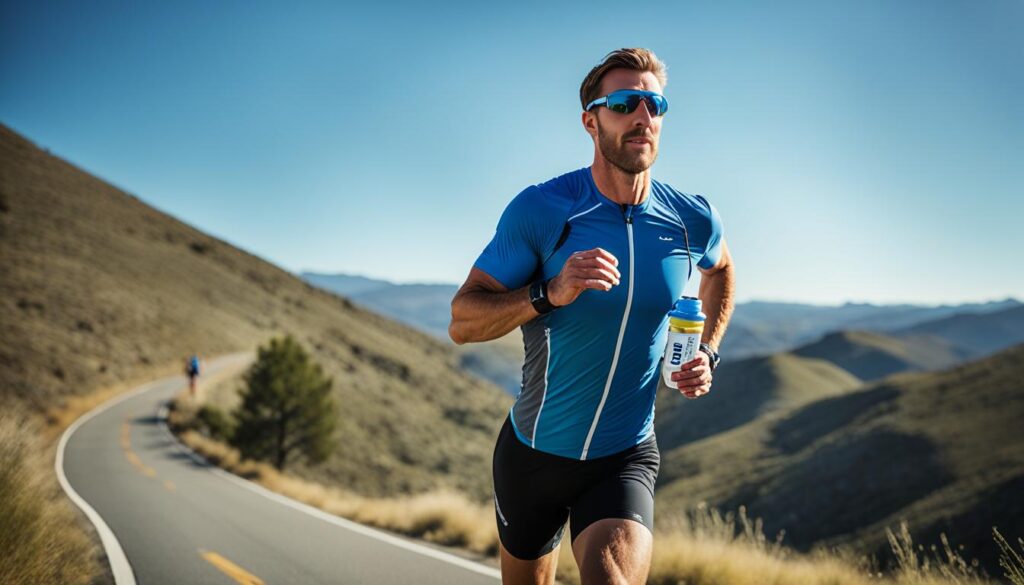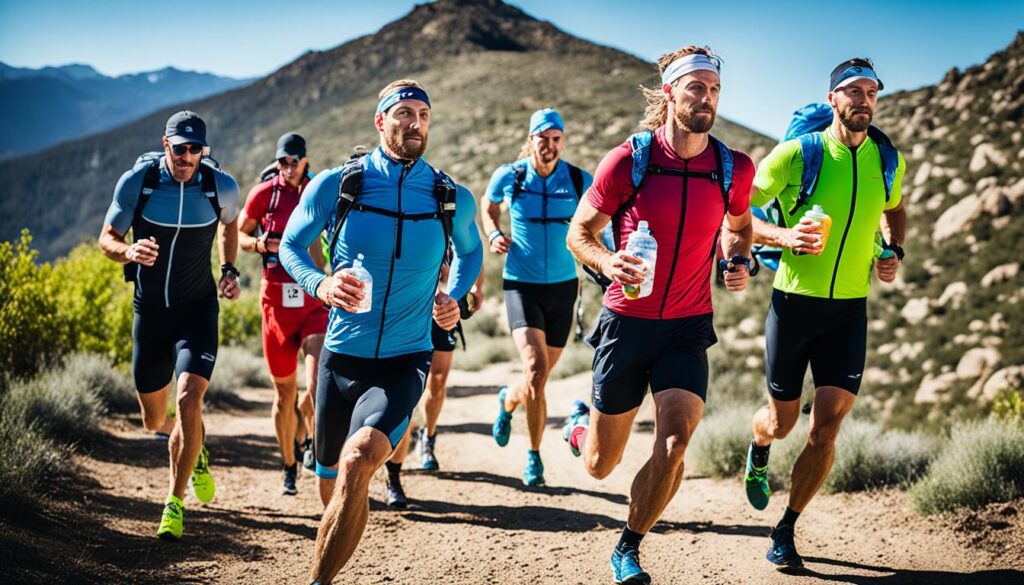For athletes, especially in endurance sports, proper hydration is key to peak performance. The art of hydration for endurance athletes separates the best from the rest. Mastering staying hydrated during long runs is crucial. It means more than just drinking water—it helps your body perform and recover.
Good hydration is about weaving sports hydration tips into your daily routine. This isn’t just advice; it’s a critical strategy, essential for pushing your limits. Achieving the right balance of fluids and electrolytes is the goal. Let’s explore how proper hydration can boost your endurance performance.
Understanding the Role of Hydration in Endurance Performance
Hydration is key in endurance sports. It helps athletes keep up their speed, energy, and health. Balancing drinking water during activity and having a hydration plan is crucial.
The Importance of Fluid Balance for Runners
For runners, keeping a good fluid balance is vital. It influences muscle work and thinking skills. They need a smart plan to drink the right amount of fluids. This plan should stop dehydration but avoid drinking too much.
A tailored plan considers how much they sweat and how long and hard they work out. It helps runners drink enough to replace what they lose. This keeps their performance top-notch.
The Science Behind Sweat and Performance
When we work out hard, we get hot, and we sweat to cool down. Sweat is more than water; it has important salts. Losing just a little bit of body water can slow runners down.
Drinking enough during exercise is key. It makes up for what is lost through sweat. This helps athletes keep going strong.
Water Intake and Its Effects on Body Temperature Regulation
Endurance activities push our body’s cooling system hard. Drinking the right amount helps control body heat. We might want to drink a lot, but it’s better to drink just enough.
This avoids problems from drinking too much. It also makes sure our heat control works well.
So, staying hydrated is well-known as important in sports. Yet, athletes need a detailed plan. This includes when and how much to drink. Following a good plan helps runners do their best.
Electrolytes: The Athlete’s Essential Minerals

Electrolytes form ions in body fluids, essential for nerve and muscle function. They’re vital for endurance athletes to maintain balance, impacting performance and health. Athletes lose minerals during intense activities, making maintaining electrolyte balance a key strategy.
Sodium is important for muscle work and keeping fluids in check. Potassium aids in heart and muscle function. Magnesium helps with muscle relaxation and energy. Calcium is crucial for bones and muscle actions, while chloride manages fluid balance. Together, they ensure maintaining electrolyte balance and proper hydration.
| Electrolyte | Function | Importance for Athletes |
|---|---|---|
| Sodium | Regulates fluids, nerve signals, and muscle contractions. | Essential to prevent hyponatremia, maintaining performance and cognitive function. |
| Potassium | Key for muscle function and proper electrical signaling in heart. | Controls heartbeat and muscle operations during intense exercise. |
| Magnesium | Assists in energy production and enzyme function. | Support recovery, energy metabolism, and muscle contractions. |
| Calcium | Vital for building and maintaining strong bones and teeth, muscle contractions and relaxation. | Keeps bones strong; prevents muscle cramps and maintains normal heart rhythm. |
| Chloride | Helps maintain a normal balance of body fluids. | Assists in preserving the body’s natural pH balance during rigorous workouts. |
Runners and endurance athletes must replace important minerals during and after workouts. This helps prevent cramps and other issues. Electrolyte balance lets cells keep producing energy for sports. It supports athletes in all physical activities, from sprints to marathons.
Hydration for Endurance Athletes: Striking an Electrolyte Balance
For endurance athletes, maintaining an electrolyte balance means more than just drinking water. It involves smart fluid replacement during exercise. Athletes lose essential minerals as they push their limits. Knowing which electrolytes to replenish helps them stay at peak performance.
Identifying Signs of Electrolyte Imbalance During Exercise
Athletes can spot early signs of electrolyte imbalance if they know their body’s signals. Signs like muscle cramps, fatigue, and side stitches are red flags. These symptoms show the body needs a balanced water intake for athletes.
Key Electrolytes for Endurance Running: Sodium, Magnesium, and Potassium
Sodium, magnesium, and potassium are crucial for muscle function and water balance. These minerals are in many foods and supplements. But athletes need to ensure they are replaced adequately during endurance activities.
How to Replenish Electrolytes Effectively
Replenishing electrolytes goes beyond eating foods and drinking fluids rich in them. It’s about the right timing and understanding sports hydration tips. Planning hydration can prevent overhydration or electrolyte overload.
| Electrolyte | Importance | Sources for Replenishment |
|---|---|---|
| Sodium | Regulates fluid balance and supports nerve and muscle function. | Salt tablets, sports drinks, and salty snacks post-workout |
| Magnesium | Involved in energy production and muscle contraction. | Nuts, seeds, leafy greens, and magnesium supplements |
| Potassium | Helps with muscle functions and prevents muscle cramps. | Bananas, potatoes, oranges, and sports gels with potassium |
The Impact of Climate and Environment on Hydration
Endurance athletes need to understand how climate affects their hydration. Different weather requires different hydration strategies. Hot climates lead to more sweat and humidity stops sweat from evaporating. This can make your body hotter and cause more fluid loss.

In cold weather, you might not feel as thirsty, and dry air can make you lose more water when you breathe. Athletes training or competing at high altitudes breathe faster. This can make them dehydrated quicker. Knowing how the weather and altitude affect hydration is key for hydration for endurance athletes.
Understanding the unique demands of your running environment is the foundation of a solid hydration strategy that will help you perform at your peak and protect your health.
Athletes should change how they hydrate based on their activity, how long it lasts, and the weather. Here are some tips:
- Increase fluid intake on hot and humid days to compensate for greater sweat loss.
- Consume warm water and electrolyte-rich drinks during cold weather activities to maintain core temperature and fluid balance.
- Hydrate frequently at high altitudes, even if not thirsty, to keep up with the increased rate of water vapor loss during respiration.
Making smart changes to how you hydrate can help keep your performance up. It also prevents problems caused by hydration in different climates.
Risks Associated with Improper Hydration: Dehydration and Overhydration
Endurance athletes must replace fluids during exercise. It’s vital to know how to stay hydrated without risking dehydration or overhydration. Knowing the balance can affect an athlete’s health and performance.
Recognizing the Symptoms of Dehydration
Dehydration is a silent threat during long activities. Early signs like dry mouth and tiredness show the body needs more water. Athletes must watch for these signs to avoid serious health issues.
Understanding Hyponatremia and Overhydration
Taking in fluids while exercising is crucial, but too much can be dangerous. Drinking too much without enough electrolytes causes hyponatremia. This condition lowers sodium levels, which can disrupt the body’s normal functions.
Prevention Strategies for Fluid-Electrolyte Imbalances
To prevent dehydration and overhydration, athletes should adjust their fluid and electrolyte intake. This table gives a clear comparison of symptoms and how to avoid dehydration and hyponatremia. It helps athletes find the right balance for safe exercise.
| Condition | Symptoms | Prevention Strategies |
|---|---|---|
| Dehydration | Dry mouth, fatigue, dark urine | Sip small amounts of water regularly, and monitor urine color |
| Hyponatremia | Headache, nausea, confusion | Maintain electrolyte balance, avoid excessive fluid intake |
| Difference | Water deficit vs. sodium deficit | Personalized hydration plan vs. controlled and conscious intake |
Developing a Personalized Hydration Strategy for Athletes
The journey into endurance sports is not just about tough training. It also demands a solid hydration strategy. This path varies with each athlete, needing a plan that matches personal needs and sport type. Getting the hydration schedule right, knowing about hydration for athletes, and using hydration tips are key to a good plan.
Pre-exercise Hydration Tips
Setting up for hydration success starts well before the event. Athletes should drink 0.07 to 0.14 ounces of water for each pound they weigh before they start. This prep helps the body get ready for the effort to come. It can be tailored to match sweat loss and the weather conditions.
Maintaining Hydration During Endurance Events
Keeping up with hydration during the event is a balancing act. The aim is to replace fluids and electrolytes as fast as they are lost. This means keeping an eye on what and how much you drink, and listening to what your body tells you. Doing this helps keep performance up for longer times.
Post-exercise Recovery: Rehydrating the Right Way
After the event, it’s crucial to refill the body’s tank. The right post-exercise hydration includes both fluids and important electrolytes. They help fix and ready the body for more activities. This step is as vital as the prep and hydration during the event. It ensures the whole plan works well.
To sum up, endurance athletes do best when they tailor their hydration to their own needs and activities. A smart hydration schedule does more than boost performance. It also keeps you healthy. This makes mastering hydration an art that values careful planning.
Conclusion
For athletes, there’s no single rule for perfect hydration. It’s key for endurance athletes to understand their body’s needs. Knowing about their body, the environment, and how to keep a good electrolyte balance is crucial. This knowledge helps them not only to do well in sports but also to stay healthy.
Getting the right electrolyte balance starts with knowing your body and how it reacts to exercise and weather. Endurance athletes need to know how much they sweat and what they lose when they do. They then adjust their drinking to stay hydrated. This personalized approach leads to optimal hydration, which is key to doing well and living a healthy life.
Achieving optimal hydration isn’t just about drinking water before, during, and after working out. It involves making a detailed plan that fits the athlete’s body, how hard they train, and the weather they train in. By finding the perfect middle ground, they have what they need to take on tough endurance challenges. They can recover well afterwards, too, continuing to enjoy the sports they love.




